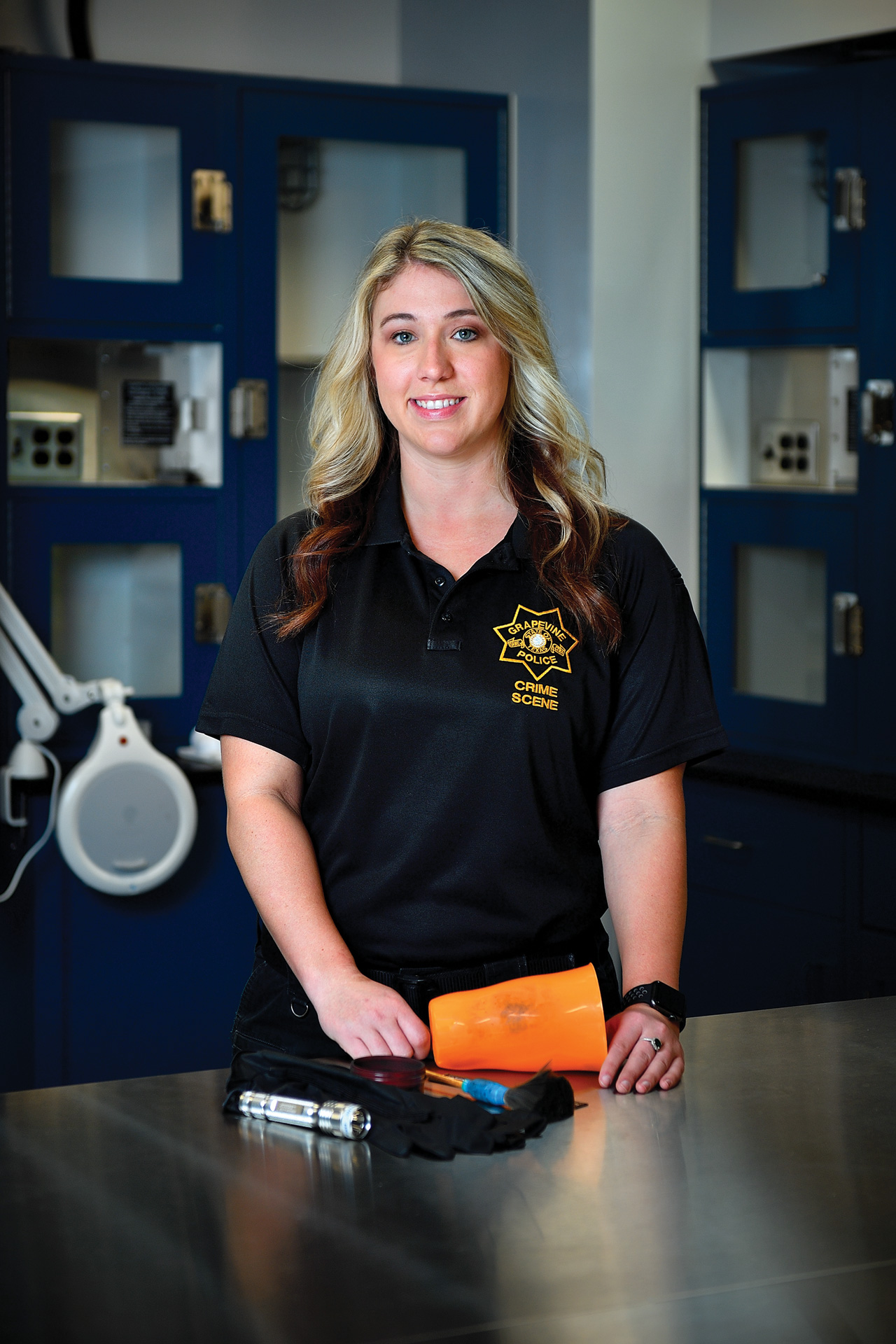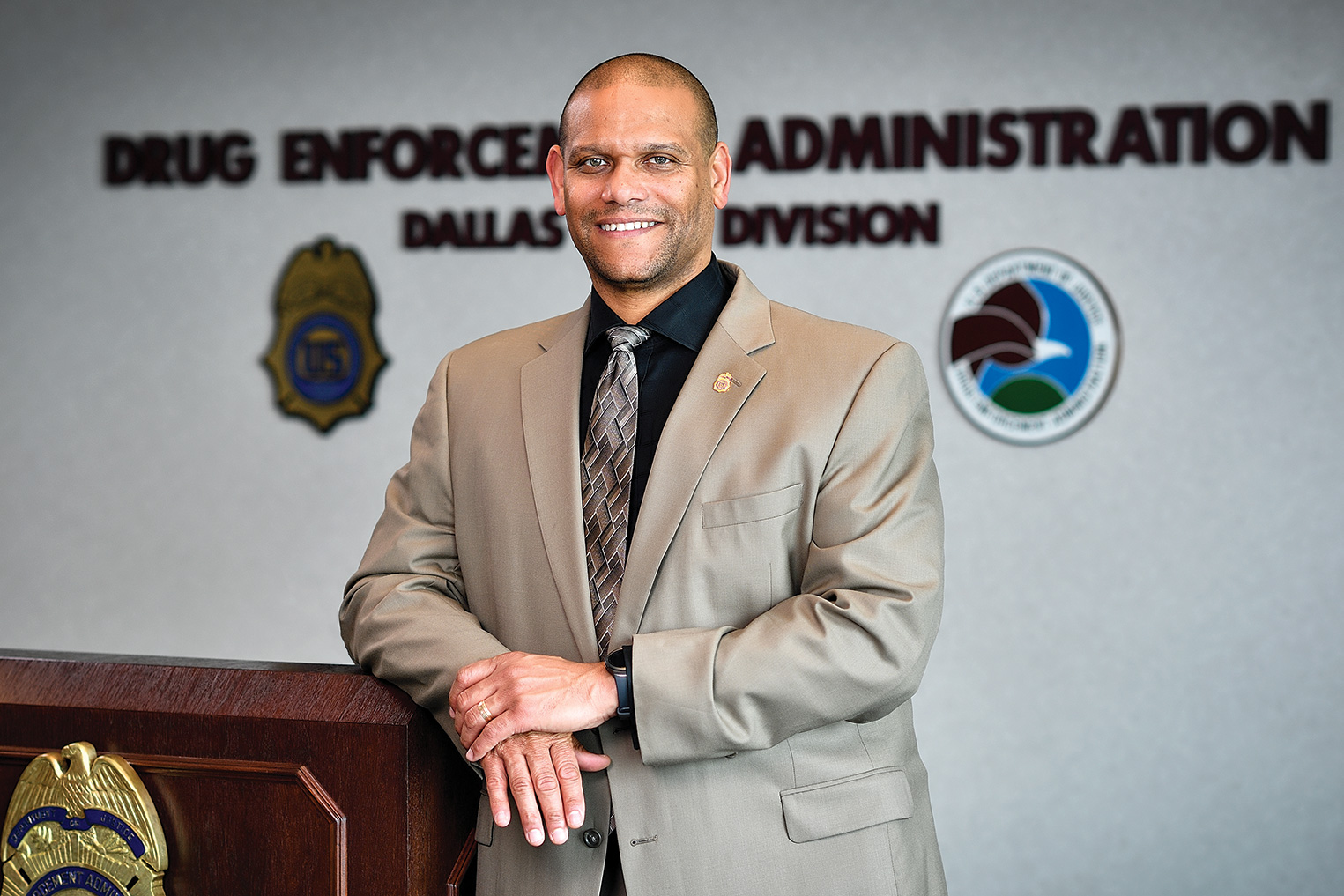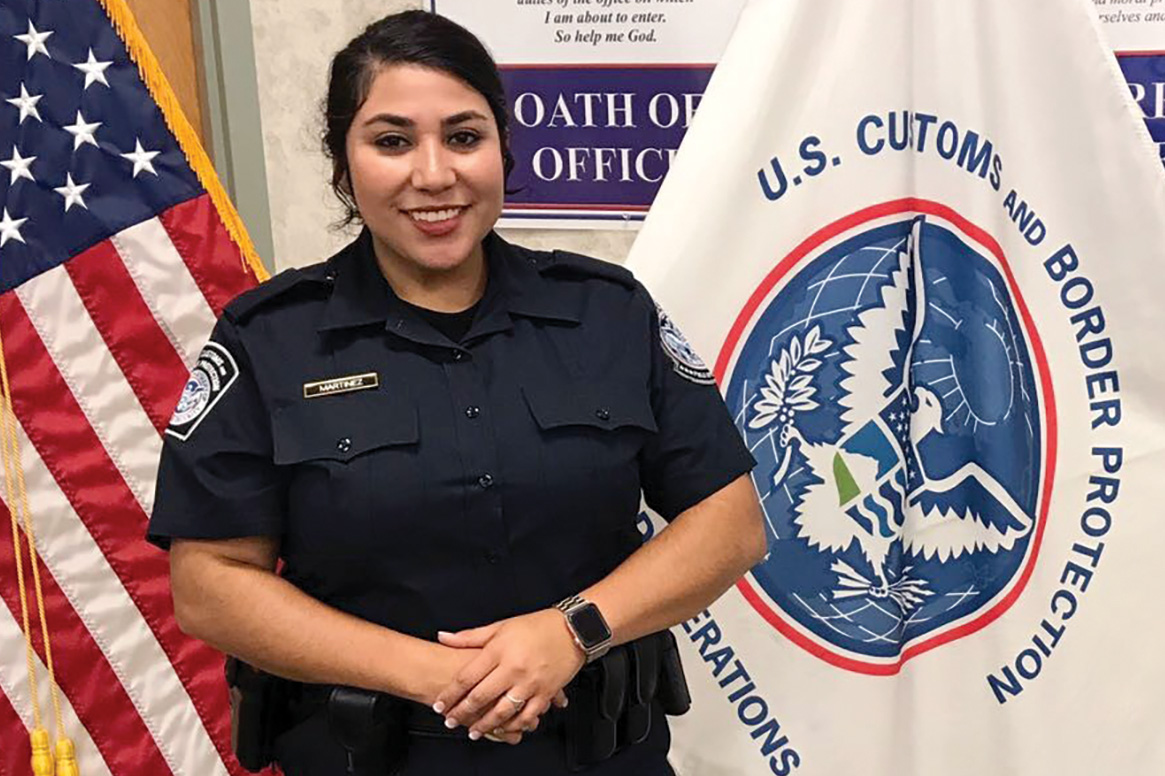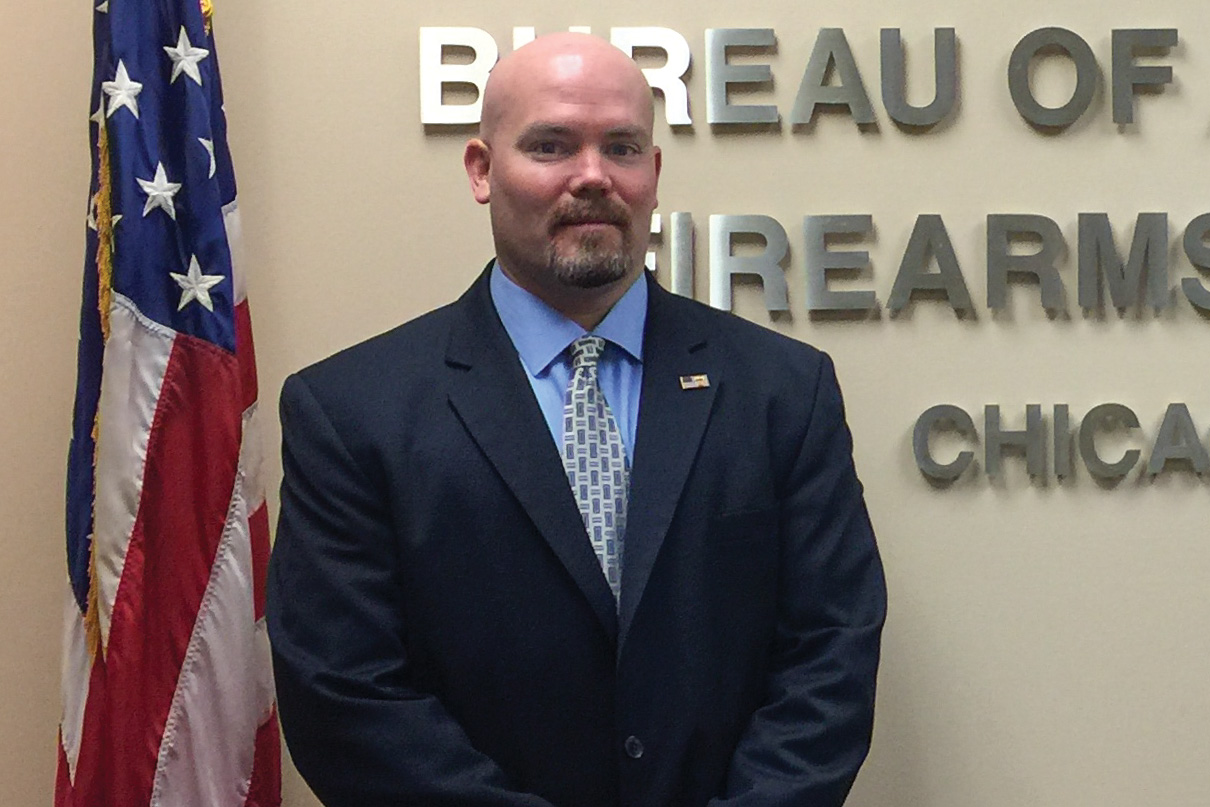ara Owens ('11, '13 M.S.), a crime scene investigator with the Grapevine Police Department, was just about to walk out of the station to enjoy her day off when her boss said a body had been found in the city.
March 23, 2018
T

Tara Owens ('11, '13 M.S.) (Photo by Michael Clements)
When Owens and her colleagues arrived at the heavily wooded area, they came upon a horrific scene -- a dismembered, burning body. Owens would spend the next 15 hours at the site collecting evidence, and that work helped to identify the victim.
A suspect was arrested on capital murder charges less than a week later. As Owens waits for the trial to wind its way through the judicial system, her job goes on.
"There really is no such thing as a typical day in law enforcement," she says. "You never really know what you are going to be facing."
Cases can run the gamut from auto burglary to assault to murder.
"We work the scene and provide the information needed to make an arrest," she says.
Owens, who spent a year working at a firearms lab before joining Grapevine PD in 2015, says that while seeing dead bodies is a weekly, sometimes daily, part of the job, some cases are hard to forget.
"You meet the friends and family, and it does stick with you," she says. "The best part of the job though is making sure justice is served."
Owens earned both of her degrees from UNT's Department of Criminal Justice, part of the College of Health and Public Service. The criminal justice major -- one of UNT's 10 largest undergraduate majors -- prepares students for careers in law enforcement or in the corporate world, where organizations need help investigating internal theft and fraud. The UNT graduate criminal justice program offers classes on the Denton campus, or students can choose a 100-percent online option, which is ranked 34th in the nation by U.S. News & World Report.
The Cyber Forensics Lab housed at UNT's New College at Frisco is under the direction of Scott Belshaw, associate professor of criminal justice. Through digital forensics, research and education, the lab helps law enforcement and the military with cyber innovations needed for modern crime- fighting, particularly in the analysis of cell phone data.
Owens' focus of study while in graduate school was bullet deflection off human tissue and small bones. She was able to teach labs for the undergraduate criminalistics students.
"I continue to teach classes at local high schools," she says, "and I use the skills and knowledge that being a graduate assistant taught me."
Two criminal justice professors stand out in her mind for their impact on her education and career. She says Adam Trahan, director of graduate programs in the department, was a major influence in her decision to attend graduate school.
"He was always available with an open ear to toss ideas around and discuss educational opportunities," she says.
When it comes to her career, she credits lecturer Edward Hueske with helping her decide on a major.
"After taking one of his courses and being intrigued by his experience and love for the job, I made my decision to stick with criminalistics," Owens says.
Hueske, a firearms examiner himself, was her research mentor at UNT, and when she worked for the private firearms lab after graduation, she was able to do ballistics testing for law enforcement cases from across the country. She ultimately would like to get back to that type of work.
"My job with Grapevine is a great opportunity for me to be out in the field," she says. "When I do eventually get back into the firearms lab, I'll have a better idea of what I need from the scene investigators."
On the front lines

Anthony Carter ('94) (Photo by Michael Clements)
During his 19-year career with the U.S. Drug Enforcement Administration, Anthony Carter ('94) has found himself in a variety of locations and challenging situations -- from Detroit to McAllen, to working with foreign counterparts in Lebanon, Syria, Israel, Jordan and Cyprus.
"Our role overseas is to work with local cops to bridge the gaps in what they can provide due to a lack of resources as well as to find an illegal drug nexus in the U.S., " he says.
After a stint in Arizona and Arlington, Virginia, Carter is now an assistant special agent in charge of the Dallas Field Division. One of the many units he oversees is the Tactical Diversion Squad devoted to fighting the opioid crisis.
"We are going after the doctors who are overprescribing and the pharmacies that are handing out drugs like candy," he says.
Carter, who began his career as a Dallas police officer, says UNT provided him with a strong foundation.
"That made things easier when I became a law enforcement official," Carter says. "The critical thinking skills I learned at UNT have been so valuable in the field."
He says criminal justice professors like Peggy Tobolowsky, along with an internship at the Denton County Sheriff's Department his senior year, helped pave his way to a successful career.
When he received the Firearms Proficiency award at the DEA Academy in Quantico, Virginia, he says he was most proud to hear the announcer say, "Graduated from the University of North Texas in Denton, Texas, with a criminal justice degree."
Protecting the border

Courtesy of Savannah Rae Martinez ('16)
Savannah Rae Martinez ('16) has a family tradition of service. Her father is a police officer and her mom and stepdad both work for the federal government. So her job as a U.S. Customs and Border Protection officer is a perfect fit. Martinez began her career with Customs last March, and was assigned to Pembina, North Dakota, a northern border port of entry from Canada.
She says her career of choice has brought with it many surprises.
"I think the hardest part to get used to is people lying to me when they are seeking admission into the U.S.," Martinez says, then adds, laughing, "That and the language barrier, since they sometimes speak German or Chinese."
She is not only checking people's passports but also inspecting commercial shipments such as produce or construction equipment.
"We have to make sure that the commercial shipments are following Customs laws and regulations," Martinez says, "and be really vigilant for potential terrorist activities."
When asked to name her favorite part of the job, Martinez doesn't even hesitate: "The people."
"I get to meet and talk to so many people every single day," she says. "I love hearing their stories and what they are doing and experiencing."
She says she has interest in the special response team, the K-9 unit and perhaps even working overseas.
"My journey began at UNT," she says. "I am grateful for the guidance and support during my time there as a student."
Fighting crime

Courtesy of Brendan Iber ('01)
Brendan Iber's ('01) career with the Bureau of Alcohol, Tobacco, Firearms and Explosives began with an internship during his senior year at UNT.
"That gave me an opportunity to find out what the ATF's mission was," Iber says. "I would have ended up in law enforcement, but I don't think I would have become an ATF agent without the internship."
Following graduation, with the ATF not hiring, Iber spent three years with the Carrollton Police Department before rejoining the ATF in 2004.
After stints in Arizona, Oklahoma and Georgia, he is now the assistant special agent in charge of the ATF's Chicago Field Division.
"I oversee groups who are responsible for combating the violent crime that has affected the great city of Chicago and other parts of Illinois," Iber says. "When we can take violent career offenders, trigger pullers, etc., off the streets and away from the public, I cannot help but feel encouraged."
Iber says criminal justice professors like Tory Caeti, who passed away in 2006, gave him a solid base on which to begin his career.
"Every semester, I'd scour the course catalog for classes he taught," he says. "I would like to complete this career and be able to look back and say that I actually made a difference, that I was a positive influence on people and that I never gave up no matter how difficult the task."
UNT Cyber Forensics Lab
UNT's Cyber Forensics Lab, which opened in 2017 at UNT's New College at Frisco, is a research facility that analyzes cell phone data from devices used in criminal activities for law enforcement in the North Texas region, and designs products and software for law enforcement and the military.
"We have three components to the lab -- the digital forensics aspect, research and innovation, and the educational piece," says Scott Belshaw, associate professor of criminal justice and lab director. "We blend the components together by training people to understand the importance of cyber innovation in fighting crime in a modern world."
Monthly brainstorming and training sessions at the lab bring together area law enforcement experts, students from various UNT departments and others from the defense community to determine immediate needs in the industry.
Currently, the research and innovation component is partnering with Richardson-based Cyber Defense Labs where researchers and students -- including some from UNT's Department of Computer Science and Engineering -- have developed anti-piracy technology for movie theaters. They also have developed and licensed software to help law enforcement create maps of data to assist in catching suspects with cell phones, and UNT art students are designing packaging for the project. GIS faculty from the Department of Geography and the Environment are helping with new software that tracks cell phone data to determine if a suspected criminal was in a specific area at the time of a crime, which can be used as evidence by court prosecutors.
"We've taken cell phone data analysis that used to take three months down to seconds," Belshaw says. "And, in law enforcement, we know that every second counts."